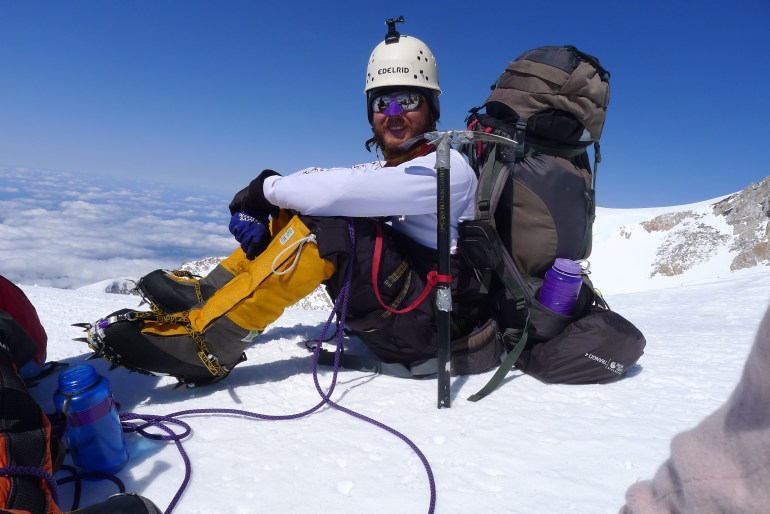Ever have a tough time getting out of bed in the morning? What if you had to get yourself out of bed 6 times in a single day?! This week’s Shoestring Warrior did just that and rowed a rowboat for 2 hours on and 2 hours off 24/7 as his team raced across the Atlantic Ocean! Meet Shoestring Warrior, engineering manager, rower, and mountaineer Chris Crane! Chris was introduced to the outdoors as a kid and his first experience of being passionate about the outdoors was when he was a teenager on a mountaineering trip with his father on Mount Shasta. He has since done numerous expeditions with his adventurous family, including Everest and Denali and has many harrowing tales to tell! Perhaps the most challenging expedition yet was the one he did in a rowboat on the Atlantic.
We were all having dreams of making land, only to be awakened to the harsh reality we were still out on the open seas. While we fought with some crazy weather and conditions, the mental fight was definitely the most challenging.
Keep reading to learn more about what life on a rowboat is like and to find out what Chris’s fondest memory is of his Everest expedition!
Shoestring Warrior: Chris Crane
Hometown:
Modesto, CA
Current Location:
Denver, CO
Profession:
Engineering Manager
What are your passions outside of work?
I try to get outside as much as possible. Weekend camping trips, hikes, or just exploring new areas. Spending time in the sunshine and fresh air is definitely my way to recharge.
Tell us about yourself!
My name is Chris! Originally from Modesto, CA, I moved to southern California to go to school at UCLA (go Bruins!) and stayed in the LA area for about a decade. I moved out to Denver just over 2 years ago and am loving the city and the easy access to mountains. I have worked in the residential solar industry for over 6 years now and am really passionate about renewable energy; it’s great to be able to make a difference to people and the environment with such interesting work.

How would you describe your level of camping experience?
I would say I am a moderately advanced camper. I’ve done most styles, from long backpacking trips with minimal margins on space/weight, to some pretty fancy glamping trips where we don’t make it far from the car, and dealt with plenty of weather and geographic conditions with either.
I haven’t (yet) spent a night on a port-a-ledge, so I do still have some experiences to go!
When did you first discover your love for the outdoors?
Thats a tough one… My earliest memories involve being very young and my dad dragging me out into the snow under the pretense of “character building”, which I wasn’t exactly enthusiastic about at the time. Probably my first experience of being really passionate about the outdoors was when I was 13 or 14; my dad took me on my first real mountaineering trip to Mount Shasta. We didn’t make the summit (it was the dead of winter, by the way, and apparently Shasta takes its winter weather very seriously), but realizing that you could push your body and endure some pretty brutal conditions, and still end the day pretty happy, in a cozy ice cave with warm drinks and good friends, I was sold.

About 6 years ago you and your three teammates rowed a rowboat across the Atlantic Ocean as competitors in the Talisker Whisky Atlantic Challenge. What kind of training did you do to get ready for such a physically and mentally demanding race?
Probably not enough! We knew our rotations would be two hours of rowing at a time, so the bulk of the training was doing multiple 2 hour sessions a day on rowing machines in a gym. We also did a 24 hour event as a team where we all took turns rowing 2 at a time for 2 hours on/2 hours off to really experience what it’s like to have such little break for an extended period, and in the last few weeks leading up to the event we did an overnight on the boat (we did not have the boat water ready until near the end of prep, so this wasn’t an option until the end).
Despite this training, it’s really hard to prepare for what it’s like to follow a 2 hour on/2 hour off watch schedule, 24/7 (except for storms/boat stoppages for maintenance).
The sleep deprivation really catches up; when you stop rowing you will typically do some self-cleaning, cook and eat, and maybe write in the journal or do some boat maintenance/organization, which would leave you with maybe less than an hour to sleep before you have to go back out to row again. Also, the wear on your body from sun, salt spray, and constant rowing (including the sliding seats, which can get a little sticky and blister your butt) add up as well. In all, the physical conditioning required for something like this pales in comparison to the mental demands, which are really difficult to prepare/train for.

What was the most challenging part about being on a rowboat for such a long time?
In normal life, oftentimes, getting out of bed in the morning can be a challenge (at least for me). On the boat, you have to wake up 6 times a day. The combination of sleep deprivation, soreness, and your body being worn out just builds throughout the trip.
By the last few weeks, it seemed like every venture out of the cabin was met with a bit of despair.
We were all having dreams of making land, only to be awakened to the harsh reality we were still out on the open seas. While we fought with some crazy weather and conditions, the mental fight was definitely the most challenging.
You’ve traveled to Everest Base Camp with your dad as he set out to summit Everest. What is one of your fondest memories from that experience?
Hrm, lots of fun memories from that one. The Puja ceremony was pretty special, where a Lama blessed our equipment and expedition. I also look back on spending some lazy evening in the mess tent playing chess with some Sherpas (they destroyed me, by the way); or there was the last day of the expedition, back at base camp, loading everything up, where my brother, Johnathan, and I decided it would be a good idea to lose our shirts and work on our tans at 17,000′. Spoiler alert – that was not a good idea.

What do you think are the top three most important skills for being a good teammate on an outdoor adventure?
Communication, consideration, and a good attitude.
No one wants to be in a tough situation with a downer.
Which mountaineers, rowers, or adventurers inspire you the most?
I grew up with a lot of stories of the likes of George Mallory, Andrew Irvine, Edmund Hillary, Christian Bonington, Dougal Haston, all the old school climbers. More recently, and with the help of film and social media, it’s hard not to get constant inspiration by current climbers like Conrad Anker, Jimmy Chin, and Alex Honnold.
Funniest outdoor experience/mishap?
Whoo, another toughie. Let’s see, I did a weekend backpacking trip around Mt. Wilson near LA a few years back with some friends. Most of my experience regarding bears was to either bring a bear canister, or be at high enough elevation you don’t need to worry about them. This time around we planned to put up a bear bag, which was a first for me. Between trying different kinds of rocks and logs for weights, practicing throwing the various weights over branches, having branches snap on us, almost hitting each other in the head with said weighted-rope (leading to the phrase, “rock watch”), we spent a solid ~3 hours trying to get that damned bag strung up. Full disclosure, we *may* have started drinking beer upon getting to the campsite, which may have impaired our bear-bagging abilities. Also, after all that, when we woke up in the morning the branch had bowed enough our food was hanging about 3 feet off the ground anyways. Definite learning experience.
Where’s your next adventure?
I don’t have any big adventures planned at the moment, but lots of solid weekender trips to keep me busy through the end of the year. In addition to the trip to Everest, I’ve been down to Aconcagua in Argentina 3 times now and summited Denali 3 years ago with my dad, brother and uncle, so in keeping with the 7 summits theme (even if the trip doesn’t include an actual summit each time), I think a trip to Tanzania and Kilimanjaro is high on the list.

The perfect s’more? (if you don’t like s’mores, what’s your favorite campfire dessert?)
Who doesn’t like s’mores? I think the keys to a good s’more are, 1) get the marshmallow a nice golden brown shell with a nice melty interior (takes practice), and 2) add the secret ingredient – a layer of peanut butter! The PB also acts as a nice binder to keep everything together.
Photos © 2018 Chris Crane





